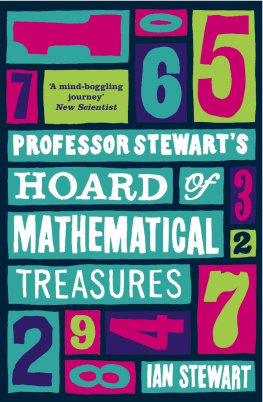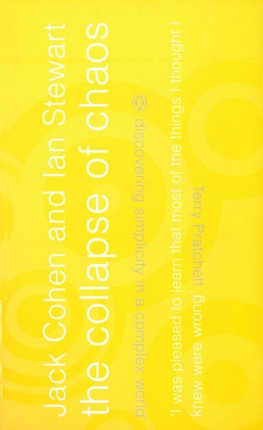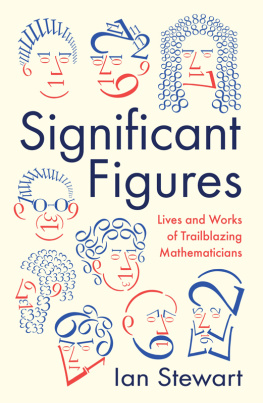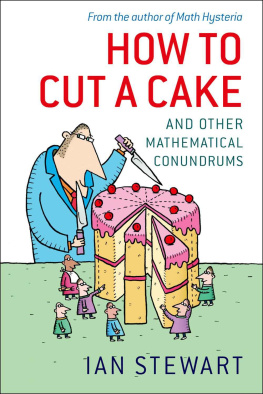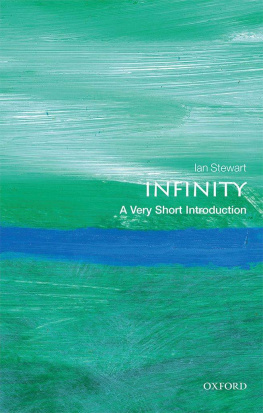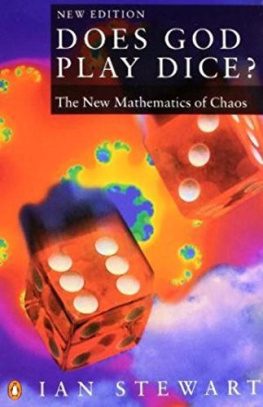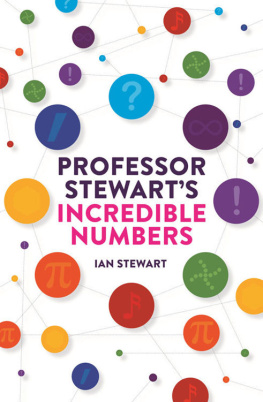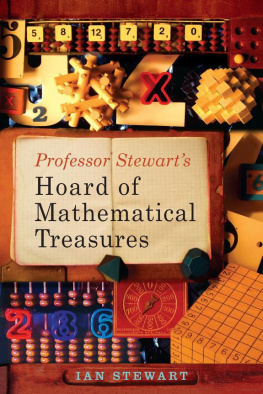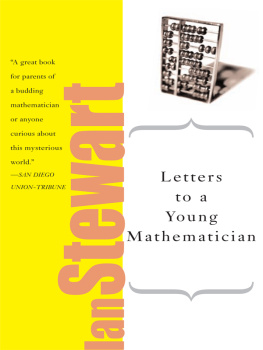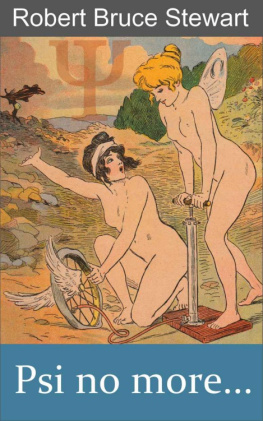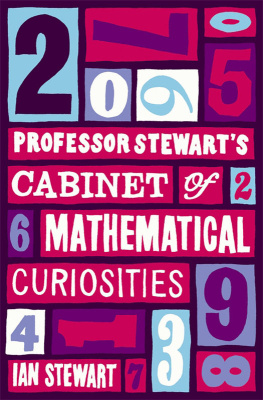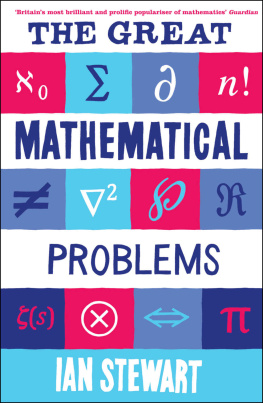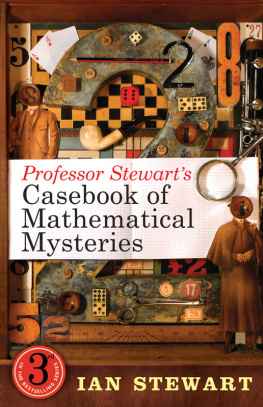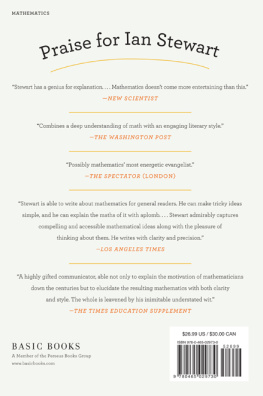Ian Stewart - Professor Stewart’s Hoard of Mathematical Treasures
Here you can read online Ian Stewart - Professor Stewart’s Hoard of Mathematical Treasures full text of the book (entire story) in english for free. Download pdf and epub, get meaning, cover and reviews about this ebook. year: 0, genre: Children. Description of the work, (preface) as well as reviews are available. Best literature library LitArk.com created for fans of good reading and offers a wide selection of genres:
Romance novel
Science fiction
Adventure
Detective
Science
History
Home and family
Prose
Art
Politics
Computer
Non-fiction
Religion
Business
Children
Humor
Choose a favorite category and find really read worthwhile books. Enjoy immersion in the world of imagination, feel the emotions of the characters or learn something new for yourself, make an fascinating discovery.
- Book:Professor Stewart’s Hoard of Mathematical Treasures
- Author:
- Genre:
- Year:0
- Rating:3 / 5
- Favourites:Add to favourites
- Your mark:
- 60
- 1
- 2
- 3
- 4
- 5
Professor Stewart’s Hoard of Mathematical Treasures: summary, description and annotation
We offer to read an annotation, description, summary or preface (depends on what the author of the book "Professor Stewart’s Hoard of Mathematical Treasures" wrote himself). If you haven't found the necessary information about the book — write in the comments, we will try to find it.
Professor Stewart’s Hoard of Mathematical Treasures — read online for free the complete book (whole text) full work
Below is the text of the book, divided by pages. System saving the place of the last page read, allows you to conveniently read the book "Professor Stewart’s Hoard of Mathematical Treasures" online for free, without having to search again every time where you left off. Put a bookmark, and you can go to the page where you finished reading at any time.
Font size:
Interval:
Bookmark:
Professor Stewarts Hoard of Mathematical Treasures
PROFESSOR IAN STEWART is best known for making mathematics accessible and popular. He was awarded the Royal Societys Michael Faraday Medal for furthering the public understanding of science, and became a fellow of the society in 2001. His many popular science books include Does God Play Dice?, Flatterland, Letters to a Young Mathematician, How to Cut a Cake and, with Terry Pratchett, The Science of Discworld. He is the mathematics consultant for the New Scientist and a professor of mathematics at the University of Warwick. He is married and has two sons.
By the Same Author
Professor Stewarts Cabinet of Mathematical Curiosities
Concepts of Modern Mathematics
Game, Set, and Math
Does God Play Dice?
Another Fine Math Youve Got Me Into
Fearful Symmetry (with Martin Golubitsky)
Natures Numbers
From Here to Infinity
The Magical Maze
Lifes Other Secret
Flatterland
What Shape Is a Snowflake?
The Annotated Flatland (with Edwin A. Abbott)
Math Hysteria
The Mayor of Uglyvilles Dilemma
Letters to a Young Mathematician
How to Cut a Cake
Why Beauty Is Truth
Taming the Infinite
with Jack Cohen
The Collapse of Chaos
Figments of Reality
What Does a Martian Look Like?
Wheelers (science fiction)
Heaven (science fiction)
with Terry Pratchett and Jack Cohen
The Science of Discworld
The Science of Discworld II: The Globe
The Science of Discworld III: Darwins Watch
Hoard of
Mathematical Treasures

Ian Stewart

This paperback edition published in 2010
First published in Great Britain in 2009 by
PROFILE BOOKS LTD
3A Exmouth House
Pine Street
London EC1R 0JH
www.profilebooks.com
Copyright Joat Enterprises 2009, 2010
10 9 8 7 6 5 4 3 2 1
Text design by Sue Lamble
Typeset in Stone Serif by Data Standards Ltd, Frome, Somerset.
Printed and bound in Britain by CPI Bookmarque, Croydon, Surrey.
The moral right of the author has been asserted.
All rights reserved. Without limiting the rights under copyright reserved above, no part of this publication may be reproduced, stored or introduced into a retrieval system, or transmitted, in any form or by any means (electronic, mechanical, photocopying, recording or otherwise), without the prior written permission of both the copyright owner and the publisher of this book.
A CIP catalogue record for this book is available from the British Library.
ISBN 978 1 84668 346 6
eISBN 978 1 84765 262 1
The paper this book is printed on is certified by the 1996 Forest Stewardship Council A.C. (FSC). It is ancient-forest friendly. The printer holds FSC chain of custody SGS-COC-2061. FSC

The following figures are reproduced with the permission of the named copyright holders:
(What Seamus Didnt Know); Suppiya Siranan.
(What is the Area of an Ostrich Egg?); Hierakonpolis expedition, leader Rene Friedman, photograph by James Rossiter.
(Mathematical Cats); Dr Sergey P. Kuznetsov, Laboratory of Theoretical Nonlinear Dynamics, SB IRE RAS.
(How to See Inside Things); Brad Petersen.
(Alexanders Horned Sphere);from Topology by John G. Hocking and Gail S. Young, Addison-Wesley, 1961.
).
).
(The Klein Bottle); Konrad Polthier, Free University of Berlin.
).

When I was fourteen, I started collecting mathematical curiosities. Ive been doing that for nearly fifty years now, and the collection has outgrown the original notebook. So when my publisher suggested putting together a mathematical miscellany, there was no shortage of material. The result was Professor Stewarts Cabinet of Mathematical Curiosities.
Cabinet was published in 2008, and, as Christmas loomed, it began to defy the law of gravity. Or perhaps to obey the law of levity. Anyway, by Boxing Day it had risen to number 16 in a well-known national bestseller list, and by late January it had peaked at number 6. A mathematics book was sharing company with Stephenie Meyer, Barack Obama, Jamie Oliver and Paul McKenna.
This was, of course, completely impossible: everyone knows that there arent that many people interested in mathematics. Either my relatives were buying a huge number of copies, or the conventional wisdom needed a rethink. So then I got an email from my publisher asking whether there might be any prospect of a sequel, and I thought, My suddenly famous Cabinet is still bursting at the seams with goodies, so why not? Professor Stewarts Hoard of Mathematical Treasures duly emerged from darkened drawers into the bright light of day.
Its just what you need to while away the hours on your desert island. Like its predecessor, you can dip in anywhere. In fact, you could shuffle both books together, and still dip in anywhere. A miscellany, I have said before and stoutly maintain, should be miscellaneous. It need not stick to any fixed logical order. In fact, it shouldnt, if only because there isnt one. If I want to sandwich a puzzle allegedly invented by Euclid between a story about Scandinavian kings playing dice for the ownership of an island and a calculation of how likely it is for monkeys to randomly type the complete works of Shakespeare, then why not?
We live in a world where finding time to work systematically through a long and complicated argument or discussion gets ever more difficult. Thats still the best way to stay properly informed - Im not decrying it. I even try it myself when the world lets me. But when the scholarly method wont work, theres an alternative, one that requires only a few minutes here and there. Apparently quite a lot of you find that to your taste, so here we go again. As one radio interviewer remarked about Cabinet (sympathetically, I believe), I suppose its the ideal toilet book. Now, Avril and I actually go out of our way not to leave books in the loo for visitors to read, because we dont want to have to bang on the door at 1 a.m. to remove a guest who has found War and Peace unexpectedly gripping. And we dont want to risk getting stuck in there ourselves.
But there you go. The interviewer was right. And like its predecessor, Hoard is just the kind of book to take on a train, or a plane, or a beach. Or to sample at random over Boxing Day, in between watching the sports channels and the soaps. Or whatever it is that grabs you.
Hoard is supposed to be fun, not work. It isnt an exam, there is no national curriculum, there are no boxes to tick. You dont need to prepare yourself. Just dive in.
A few items do fit naturally into a coherent sequence, so Ive put those next to each other, and earlier items do sometimes shed light on later ones. So, if you come across terms that arent being explained, then probably I discussed them in an earlier item. Unless I didnt think they needed explanation, or forgot. Thumb quickly through the earlier pages seeking insight. If youre lucky, you may even find it.
Next pageFont size:
Interval:
Bookmark:
Similar books «Professor Stewart’s Hoard of Mathematical Treasures»
Look at similar books to Professor Stewart’s Hoard of Mathematical Treasures. We have selected literature similar in name and meaning in the hope of providing readers with more options to find new, interesting, not yet read works.
Discussion, reviews of the book Professor Stewart’s Hoard of Mathematical Treasures and just readers' own opinions. Leave your comments, write what you think about the work, its meaning or the main characters. Specify what exactly you liked and what you didn't like, and why you think so.

